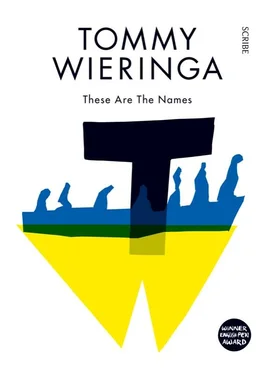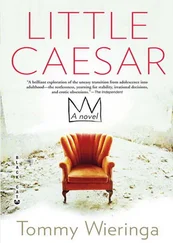The cold splinter between their eyes was their realisation that poultry could not survive the winter alone, that there was someone who fed them and locked the run to keep the predators out at night. They left Vitaly beside the fire and searched the houses and sheds. They fed themselves silly on half-frozen, rotting fruit they found at the feet of a few tangled trees. The boy threw down the apples still hanging on the branches. The fermenting fruit made them light in the head.
They gathered wood, and the boy found a wooden rake with two tines. They combed each house and every shed. It was impossible to tell whether the inhabitants had left in a hurry, or one by one, over the course of years.
When they saw a brood of chickens pecking at the ground on the bleaching green outside the village, they froze. Here was a prospect of plenty. Euphoria welled up within them, but they didn’t know quite where to start. It was too much all at once.
‘Oh-oh-oh,’ the man from Ashkhabad said.
They were reeling — they would never be fast enough to catch them. Grubbing about amid his harem was the cock, a champion rooster with long legs and a fiery red comb. This was where his life would end; their teeth ached in anticipation.
Then they saw the house.
It was a little way outside the village, half-hidden behind a mound. A few sparse poplars surrounded it.
From the chimney came a thin wisp of smoke.
In none of their imaginations had their salvation ever looked like a fairy tale.
They moved towards it hesitantly, afraid it would vanish before their eyes as they approached. The clay walls had once been white, and the farmhouse blue could still be seen on the shutters and sills. The doors and windows were all slanted, as though the house had shifted and was slowly sinking into the earth.
At the door, they stood indecisively.
‘Anybody home?’ the poacher shouted.
He pushed open the door and went inside. The others followed. They found themselves in a low-ceilinged room full shadows. The stovepipe leaked smoke; the walls were covered in soot. It was as though they had entered the inside of an old, dented kettle. At the back, beside the pump, stood an old woman. Her hair was in pigtails. Her toothless jaw had dropped open.
‘Food,’ said one of the ghosts who had invaded her house.
‘Food,’ the others said now as well.
The woman stood with her back pressed against the washbasin. There were red wooden cherries attached to the elastic bands in her hair.
‘Food! Food!’ the ghosts now shouted, all at the same time. They raised their hands to their mouths in an eating gesture. They pulled tins of food out of her cupboards, tore them open, and dug out the contents with their bare hands. Goulash. Beans. Pilaf. They drank milk sweeter than they had ever tasted. They gobbled and scoffed until they lay writhing and groaning in pain on the floor, amid their own vomit, their hands clutching their bellies.
All this time, the woman had not moved. Then she tied an apron around her waist and, stepping over the bodies on the floor, went out the door. She ladled grain from a barrel and shouted heeere chick-chick-chick! heeeere chick-chick-chick! Clucking pitifully, the chickens came running up to pick at the grain around her feet.
One by one, the ghosts left her house. She watched as they climbed the mound and walked to the house further along, their arms clutching cans of food and packs of pasteurised milk — her supplies for the winter.
The fire was out. Vitaly was gone. They poked at the fire, and hid the booty in their satchels.
Vitaly had left his own satchel behind. The thing lay between them, a clump of plastic bags, one pulled over the other, muddied, stained: a disgusting hide from which the animal itself had fled. The boy pulled it over and picked at the rope that kept the satchel closed. He yanked it free and dumped the contents onto the ground. Something heavy fell out of it, hitting the floor with a dull thud.
He shrank back with a strangled cry: lying between his legs was the black man’s head. He scuttled back away from it, on hands and knees. The dead face was looking at him, its one, intact eyelid half-open.
The woman buried her face in her hands.
‘Fuck,’ the poacher said for the second time that day. He took the thawed head by the hair, walked to the door, and tossed it into the street.
The woman stood up, wormed past him through the doorway, and came back carrying the head.
‘Have you forgotten?’ she panted, ‘how he brought us here? Is that your thanks? For this? A roof over our heads, the fire, the food in your stomach?’
She held up the head for him to see. Thin, colourless fluid dripped from the wound at the neck. ‘He steered Vitaly’s hand to cut off his head, so that he could be with us. Even in death he hasn’t left us.’
The boy took a breath to say something, but choked back his words. The poacher stared into the fire.
‘There’s something to what she says,’ the man from Ashkhabad said haltingly. ‘Our luck has changed so much since we started going south, it’s amazing.’
‘That’s no accident,’ the woman said.
The boy looked at the poacher. He wanted to know what he was thinking.
The woman pointed at the boy.
‘And have you people forgotten his dreams?’
They had not forgotten his dreams.
‘I’ll admit,’ the poacher said then, ‘I was against it. But we were definitely being pointed in the right direction.’
The others nodded. The thought gave them a sense of comfort and security.
The woman spoke, explaining the signs to them. Since the death of the black man and the boy’s first dreams, time had acted as a helpmeet; the situation had suddenly changed in their favour. The doom that had lingered over their heads from the start had dispersed and blown away. The oppression, the stone on their chests, was lifted. Who could point to any other cause than the black man’s death? She had found none; it was his death that had redeemed them. He who had brought on the oppression had lifted it, too.
‘I don’t understand it completely,’ the man from Ashkhabad said. ‘But, at the same time, I don’t see what else it could be.’
‘You don’t have to understand everything,’ the woman said. ‘It’s enough that it happened. It’s impossible to understand everything. All we have to do is be grateful.’
‘That we …’ the poacher murmured, ‘we, of all people … get to experience something like this. It’s just …’
The others nodded; yes, they had been chosen. The boy looked around wide-eyed, and saw how a shared conviction took hold of the others, how they came together around the black man’s head. His death united the opposites. A feeling of euphoria overtook him, too. Everything had, of necessity, led to this outcome. Everything had happened so that he could see it happen, so that he could tell about it later.
The poacher shook his head. ‘Who would have believed it?’ He poked at the fire and said: ‘So what now? What’s expected of us?’
‘That we follow him,’ the woman said, ‘and not doubt.’
She said that the head would lead them; they had to fear it and honour it, and not forget what they had been through.
At the heart of their little community, they reshaped his image: mercurial and ambiguous. His cruelty, but also his mercy.
How he had nourished himself with the dead.
Suddenly, in a shrill voice, the boy said: ‘At first I couldn’t believe it, but the longer I thought about it … what else could it be?’
The woman nodded. ‘He nourished himself with us.’
‘That’s why he lagged behind all the time!’ the boy cried.
‘It was him or us,’ the man from Ashkhabad said.
His death was inevitable, the way seed had to fall to the ground and perish in order to bring forth fruit again in spring. The poacher, the woman, and the boy come from farming families, so they know how that goes. They know about the eternal cycle. How new life sprouts from the dead.
Читать дальше











